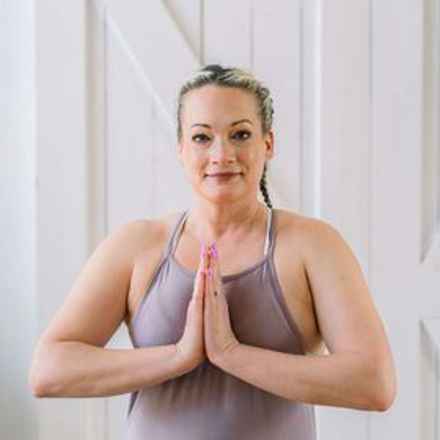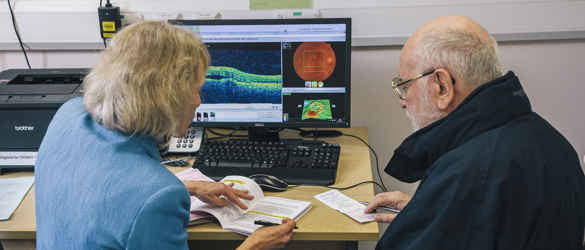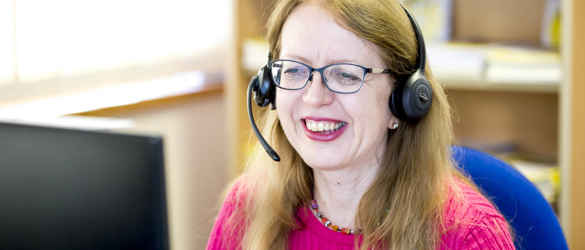“Don’t let the diagnosis rule your life."
Posted: Thursday 17 October 2024
A yoga instructor who has been diagnosed with Stargardt disease has shared how the practice has helped her cope with the condition after she was left feeing “completely alone”.
Three years ago Dawn was diagnosed with the condition at a routine eye test, where a scan revealed changes at the back of her eye.
“I remember sitting in the waiting room, looking around at people with their white canes and thinking, ‘I’m going to be like that.’ It was a real sinking feeling.”
Early signs
Looking back, Dawn, now aged 49, wondered if there were early signs in her childhood. "Looking back now I was diagnosed as dyslexic and dyspraxia as a kid. I remember my dad asking, 'why can't you catch a ball?' and I'd cry, telling him, 'I didn’t see the ball.' Was something happening with my sight even then?”
Following her diagnosis, Dawn faced a whirlwind of hospital visits, tests, and uncertainty: “At Moorfields, they told me, ‘go and live your life. There's nothing we can really do for you.’ I felt really abandoned and completely alone.”
When she researched the condition, she couldn’t find anyone in a similar situation to herself, which left her feeling more isolated.
“All I could find was older people or young children,” she said. “I'm going to be 50 next year. And there was nobody like me.”
Turning to yoga
After some time of reflection, and a call to the Macular Society Helpline, Dawn, a qualified yoga teacher, decided to turn to her practices as a way to cope. She said: “I realised that I had to live my life and not let the diagnosis define me. I thought, ‘what would I tell someone else in this situation?’ It would be ’don’t let the diagnosis rule your life,’ so I had these conversations with myself. “
Through yoga, Dawn has not only managed her mental health but has also created a platform for others facing similar challenges. She has started a YouTube channel to share her journey and offer support to those with visual impairments. “If I can help just one person, it’s worth it,” she said. “I want to show people that it’s not the end; it’s just the beginning of a beautiful journey.”
Dawn’s biggest challenge has been dealing with the uncertainty of the future. She said: “There's a lot of unknowns. I’ve found that really difficult. How long until I lose my eyesight? They don't know. How rapidly will it deteriorate? They don't know. I was the kind of person that had a five year plan, but I’ve suddenly had to really learn to live in the moment. Because if you don't live in the moment, you'll miss that moment.”
Yoga has become a vital part of Dawn’s life, giving her a different perspective. “When I teach, I’m honest with my students. I have my guide stick because of my left eye, but I tell them it’s not an obstacle; it’s my independence,” she explained. She believes that shifting the mindset is crucial. “You can’t let obstacles eat away at you. Instead, you need to celebrate the small wins,” she said.
Dawn teaches her yoga classes both virtually and in person, often with students who have their own obstacles, including muscle fatigue and limb loss. “Just showing up is sometimes enough. You’ve got to find the motivation to get on the mat,” she said. “And if I can inspire others, that’s the best thing I can do.”
Paying it back
Dawn’s focus is now on a fundraising event in support of the Macular Society, to fund vital support and research into macular disease, as she takes on the Three Peaks Challenge. “I hope to raise awareness and maybe even funds for the organisation that helped me,” she said.
“My motivation was that I really loved the help and support and that there was somebody there to answer the phone. I really wanted to raise the money for that. I'm hoping that there's more research into it and knowing why it happens.”
What to do after a macular disease diagnosis
If you’ve recently been diagnosed with macular disease, you're not alone. Find out what to expect, what support is available, and how to take control of your next steps.
Macular Society Helpline
Free information and support to those with macular disease, along with their family and friends, to help people retain their independence.




